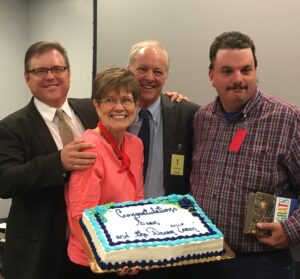Sean’s Story
 Sean’s story is a perfect illustration of a sad irony of the guardianship system. Born in the mid-1980s, he experienced a disrupted childhood that included domestic violence. Although he may have had developmental delays—he asks, “Am I on the [autism] spectrum?”— he has graduated from high school and is enrolled in an associate’s degree program at a community college to “take my life to a whole ’nother level.”
Sean’s story is a perfect illustration of a sad irony of the guardianship system. Born in the mid-1980s, he experienced a disrupted childhood that included domestic violence. Although he may have had developmental delays—he asks, “Am I on the [autism] spectrum?”— he has graduated from high school and is enrolled in an associate’s degree program at a community college to “take my life to a whole ’nother level.”
Sean’s father petitioned for guardianship some years ago to keep his mother from taking his Social Security check. At first, Sean was living with his father and stepmother, with whom he never saw eye-to-eye. After being granted guardianship, they moved him to a group home 40 minutes from where he was going to school. Sean had this to say about guardianship:
“Some people that have guardians may need one for the rest of their lives if they have a severe incapacity. For others, like me, it should be limited. It depends on the situation.” Sean was eager to return to court to establish his competency, especially as it related to his driving privileges, which had been suspended when he was found incompetent. Upon his first return to court, the judge told Sean that he needed to obtain a doctor’s note stating that he was completely competent. He then spent several months searching for a doctor who would take Medicaid and was willing to complete an MDE. He reported that he experienced “getting the runaround” between the mental health system and the court.
Through his connections with Rethinking Guardianship, Sean was introduced to a pair of attorneys, one of whom practiced in the county where his guardianship was established. For Sean, “having someone know what the heck is going on—knowing what the judge wants—instead of getting the runaround” made a huge difference. First, his attorneys explained to him that he could obtain the doctor’s note from his regular doctor, and it could be a short note, it didn’t need to be a MDE.
Sean’s rights were readily restored upon his second return to the court, this time with his lawyers and the requested doctor’s note. The local lawyer took him through a series of questions at the hearing, demonstrating his capacity in each of the areas on the capacity questionnaire routinely used in NC courts. Before they reached the end of the list, the Clerk said that he had heard enough to make his ruling, restoring Sean’s rights. When asked how his life has changed since, he says, “Well, it’s completely different. I don’t have to try to track down my guardian. I can move more quickly on the things I want to do. I got my driving rights restored and am now looking for a car.” In addition, Sean is taking a class in arboriculture and plans to look for work going through the Tree Industry Association.
Regarding decision-making, Sean is looking to put a team together that includes a realtor and a certified accountant. He recognizes the value of connections, saying “the right legal counsel will make a big difference.” He appreciates people’s input, but says, “people’s opinions are just that, opinions.” He relies on the Bible and on his strong faith. Looking back, Sean he says he wouldn’t change anything. He says he now knows how to help others and is eager to do so. He plans to remain involved with Rethinking Guardianship.

